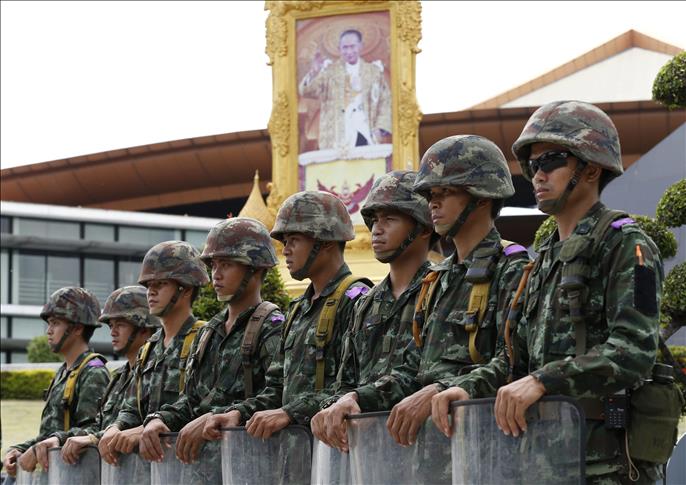
Faced with a flurry of sanctions and criticism from the U.S. and the European Union for its May 22 coup, the Thai junta has reacted with a blend of affected indifference and nationalism.
Some of its countrymen even appear to have welcomed the fight, one - Charoen Wattanasin - posting on Facebook: “Burma [Myanmar] has been able to survive as an isolated nation for 50 years, so why not us?”
The U.S. announced Wednesday its latest batch of sanctions, cutting assistance to Thailand by US$4.7 million, while also considering the placement of the largest Asia-Pacific Military exercise in the Kingdom.
On Monday, the EU decided to “suspend all official visits to and from Thailand… until a democratically elected government is in place,” adding that it would not sign a "Partnership and Cooperation Agreement" for closer political and economic cooperation.
After a meeting Tuesday with the EU representatives in Bangkok, the Thai foreign ministry’s permanent secretary, Sihasak Phuangketkeow, said the bloc’s sanctions were merely “symbolic.”
“The agreement suspension will not affect us much in practice, as Thailand is only in the initial stages of signing the document and it would take the EU years to gather approval from all 28 EU members,” said Phuangketkeow, who also serves as acting foreign minister.
The Federation of Thai Industries (FTI) - responsible for coordinating the country's socio-economic development - warned the EU on Tuesday that its decision to curtail ties with Thailand could result in mutual repercussions.
“Free trade agreements are bilateral, and if the EU continues with these measures, it too would lose benefits,” Supant Mongkolsuthree, the FTI chairman, told local media.
“The slowdown will make both sides lose,” he said.
Junta chief General Prayuth Chan-ocha has dismissed the sanctions, saying the military council “will continue solving the country’s problems by taking its pride into account.”
Despite the EU’s rebuke, Thailand will still be allowed to attend a meeting between ASEAN and EU ministers in Brussels on July 22.
Exclusion of the Thai delegation would have deeply embarrassed the country, which would have found itself in the position of Myanmar - treated as a pariah state by the EU when it was still a military dictatorship before 2011.
U.S. State Department official Scot Marciel told Congress on Wednesday that Washington was suspending more assistance programs to Thailand, including U.S.-sponsored firearms training for Thai police and a study trip to the U.S. for senior Thai police officers.
The suspended assistance, when added to the initial cuts made the day after the May 22 coup when Washington condemned the military takeover, amounts to US$4.7 million - almost half the total.
Marciel also said Wednesday that Washington was “looking closely” at cancelling Cobra Gold, a major military exercise held in Thailand every year since 1980 with the participation of 13,000 U.S. and Thai soldiers.
Outside of sanctions linked to the military takeover, the junta has also fallen foul of penalties related to long-standing issues. Thailand was downgraded June 20 to the lowest rank on the U.S. State Department’s Trafficking in Persons Report due to persistent allegations of human trafficking in the country - particularly in the sex and fishing industries.
The downgrade - which placed Thailand at the level of countries such as Syria, Iran and North Korea - could result in economic sanctions and the blacklisting of Thai products by some U.S. companies.
The entrapment of Myanmar laborers by Thai fishing vessel owners has already led to one set of sanctions - French distribution chain Carrefour suspending the purchase of prawns from the country's largest seafood conglomerate following a June 8 Guardian newspaper report into forced labor in the industry.
Although both the U.S. and EU have called for a return to full democracy, the junta's definition may also be some way apart from the demand.
Its political roadmap announces the establishment of an interim government by September, the setup of a reform council, a National Legislative Assembly by October and the organization of “fully democratic elections” by the end of 2015 - however; EU foreign ministers have termed such moves “not credible."
Both the U.S. and EU have said that they would look at further sanctions depending on the development of the situation on the ground.
The Turkish government said in a statement two days after the coup that it expects a return to democracy "in the shortest time."
“Regardless of the country, Turkey is - in principle - against the undemocratic removal of governments elected by the people,” the foreign ministry added.


